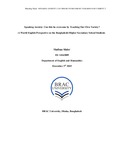Speaking anxiety : can this be overcome by teaching our own variety?

View/
Date
2015-12Publisher
BRAC UniversityAuthor
Sikder, ShafinazMetadata
Show full item recordAbstract
This study explores the practice of teaching and learning English speaking in our higher secondary school contexts. The main objective of this study was to find out the reasons behind the speaking anxiety that is often experienced by most of our second language learners. No doubt today English is the most dominant communication medium for global purposes and therefore learning to speak English becomes a big requirement in the job and educational sectors. However, the question remains that how exactly our students need to learn to speak. In other words, what is more important while speaking English in a context like ours; is it necessary to sound like the natives or is it about making successful communication while mutual understanding is being maintained? This paper therefore investigates these questions in the light of World English perspective by going through some current and traditional research works of different World English scholars of different times. For the collection and analysis of the study, a survey was done on three Bangladeshi higher secondary schools where sixty students‟ foreign language speaking anxiety was being measured with the help of Likert scale mainly on the basis of Public Speaking Class Anxiety Scale (PSCAS) developed by Yaikhong & Usaha in 2012 which has been adapted from the FLCAS of Horwitz, Horwitz & Cope (1986) and was further adapted to suit the purpose of the Bangladeshi higher secondary school candidates. The result obtained from the survey supported the research hypothesis that the higher secondary school students are having foreign language speaking anxiety while learning speaking in order to conform to the native standard instead of speaking it in their own ways. The paper has therefore been concluded with some necessary recommendations to overcome this speaking anxiety of our second language learners.
Description
This thesis is submitted in partial fulfillment of the requirements for the degree of Masters of Arts in English, 2015.Department
Department of English and Humanities, BRAC UniversityType
ThesisCollections
- Thesis, B.A. (English) [624]
